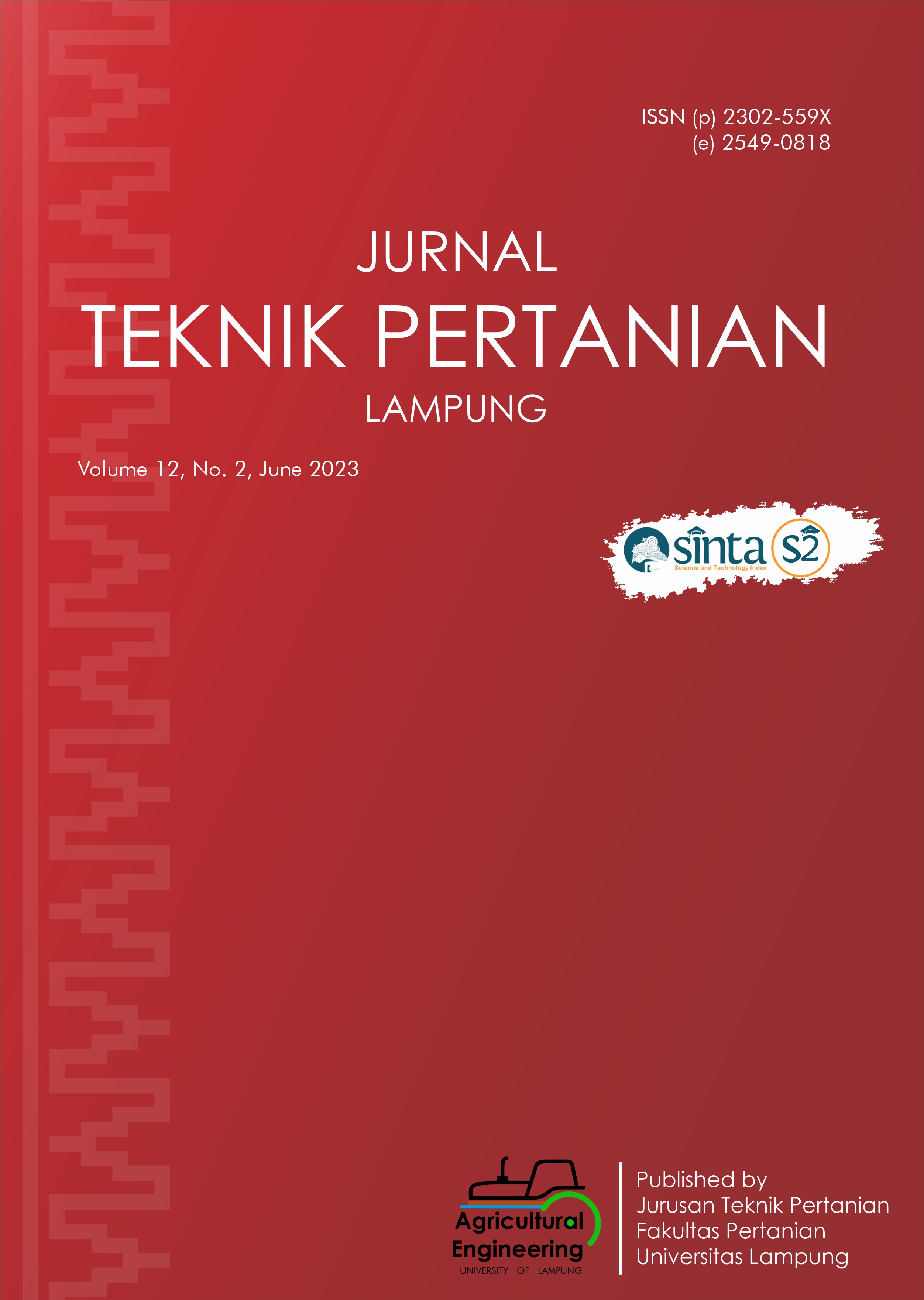Application of Chitosan and Citric Acid Coating to Increase The Storage of Marigold Flowers (Tagetes Patula L.)
DOI:
https://doi.org/10.23960/jtep-l.v12i2.277-287Abstract
Marigold is a flower that can be consumed (edible flower) in fresh condition. Marigold flower damage is characterized by withering and changing the color of the petals to brown (browning). Coating treatment combined with citric acid is expected to be one of the solutions to maintain quality and increase the shelf life of Marigold flowers.. This study aims to examine the effect of citric acid treatment and application of coating made from chitosan on changes in the quality of Marigold flowers as fresh edible flowers. The concentrations of chitosan (K) studied were 0.05% and 0.1%; while the concentration of citric acid (A) was 1% and 2%. Citric acid solution is sprayed first. After air dried, the flowers were sprayed with a coating solution and air-dried. All flower samples, both control and treatment, were packaged and stored at 10oC. During storage, respiration rate, moisture content, weight loss and color were measured. Organoleptic test was carried out by 35 panelists with hedonic values 0-5. The best treatment was A2K2 (2% citric acid and 0.1% chitosan) which was still accepted by the panelists (score 3) until the 6th day of storage with a moisture content of 83.04%, weight loss 21.05%, and the value of °hue 79.70°. A2K2 treatment could increase the shelf life of three days longer than the control.
Keywords: Chitosan, Citric acid, Coating, Edible flower, Marigold flower.
References
Alotaibi, H.N., Anderson, A.K., & Sidhu, J.S. (2021). Influence of lutein content of Marigold flowers on functional properties of baked pan bread. Annals of Agricultural Sciences, 66, 162–168. http://doi.org/10.1016/j.aoas.2021.12.002
Alsuhendra, Ridawati, & Santoso, A.I. (2011). Pengaruh penggunaan edible coating terhadap susut bobot, pH, dan karakteristik organoleptik buah potong pada penyajian hidangan dessert. Prosiding SeminarNasional FMIPA-UT 2011.
Alvarez, M.V., Ponce, A.G., & Moreira, M.R. (2013). Antimicrobial efficiency of chitosan coating enriched with bioactive compounds to improve the safety of fresh cut broccoli. LWT - Food Science and Technology, 50, 78-87. http://doi.org/10.1016/j.lwt.2012.06.021
Dhyan, C.S., Sumarlan, S.H., & Susilo, B. (2014). Pengaruh pelapisan lilin lebah dan suhu penyimpanan terhadap kualitas buah jambu biji (Psidium guajava L). Jurnal Bioproses Komoditas Tropis, 2(1), 79-90.
Farishy, A., Agassi, Ayu, Suffan, & Salamah. (2019). Asteraceae Universitas Indonesia. Jakarta (ID): UI Publishing
Fernandes, L., Saraiva, J.A., Pereira, J.A., Casal, S., & Ramalhosa, E. (2019). Post-harvest technologies applied to edible flowers: a review. Food Reviews International, 35, 1-23. http://doi.org/10.1080/87559129.2018.1473422
Gutap YC, Sharma P, Sharma G, & Agnihotri R. (2018). Edible flowers. Conference Paper. National Conference on Floriculture for Rural and Urban Prosperity in the Scenario of Climate Change-2018, 25-30
Hardenburg, R.E., Wang, C.Y., & Watada, A.E. (1990). The Commercial Storage of Fruits, Vegetables and Florist and Nursery Stocks. Washington (US): USDA.
Hardjono, Suharti, P.H., Permatasari, D.A., & Sari, V.A. (2016). Pengaruh penambahan asam sitrat terhadap karakteristik film plastik biodegradable dari pati kulit pisang kepok (musa acuminata balbisiana colla). JBAT, 5(1), 22-28. http://doi.org/10.15294/jbat.v5i1.5965
Jiang, T., Feng, L., & Jianrong, L. (2012). Changes in microbial and postharvest quality of shiitake mushroom (Lentinus edodes) treated with chitosan–glucose complex coating under cold storage. Food Chemistry, 131, 780-786. http://doi.org/10.1016/j.foodchem.2011.08.087
Jiang, Y., Joyce, D.C., & Macnish, A.J. (2000). Effect of abscisic acid on banana fruit in relation to role of ethylene. Journal Plant Growth Regulation, 19(1), 106-111. http://doi.org/10.1007/s003440000011
Kawijia, Atmaka, W., & Lestariana, S. (2017). Studi karakteristik pati singkong utuh berbasis edible film dengan modifikasi cross-linking asam sitrat. Jurnal Teknologi Pertanian, 18(2), 143-152.
https://doi.org/10.21776/ub.jtp.2017.018.02.14
Kou, L., Ellen, R., Turner, & Luo, Y. (2012). Extending the shelf life of edible flowers with controlled release of 1-methylcyclopropene and modified atmosphere packaging. Journal of Food Science, 77(5), 188-193. https://doi.org/10.1111/j.1750-3841.2012.02683.
Krochta, J.M., Baldwin, E.A., & Carriedo N. (2002). Edible Coatings and Films to Improve Food Quality. New York (US): CRC Press LLC.
Mannapperuma JD, & Singh RP. (1990). Modeling of gas exchange in polymeric package of fruits and vegetables. Paper for ASAE Winter Meeting, Chicago, 12-13 Dec 1990.
Miskiyah, Widaningrum, & Winarti, C. (2011). Aplikasi edible coating berbasis pati sagu dengan penambahan vitamin C pada paprika: Preferensi konsumen dan mutu mikrobiologi. Jurnal Hortikultura, 21(1), 68-76. http://dx.doi.org/10.21082/jhort.v21n1.2011.p68-76
Pires, T.C.S.P., Dias, M.I., Barros, L., & Ferreira, I.C.F.R. (2017). Nutritional and chemical characterization of edible petals and corresponding infusions: Valorization as new food ingredients. Food Chemistry, 220, 337–343. https://doi.org/10.1016/j.foodchem.2016.10.026
Takahashi, A.J., Rezende, A.U.G.G., Moura, M.A.F., Dominguete, L.C.B., & Sande, D. (2019). Edible flowers: bioactive profile and its potential to be used in food development. Food Research International, 129, 108868. https://doi.org/10.1016/j.foodres.2019.108868
Vina, S.Z., Mugridge, A., Garcia, M.A., Ferreyra, R.M., Martino, M.N., Chavaes, A.R., & Zaritzky, N.E. (2007). Effect of polyvinylchloride film and edible strach coatings on quality aspects of refrigerated brussels sprouts. Food Chem, 103, 701-709. https://doi.org/10.1016/j.foodchem.2006.09.010
Yulianti, H., Dyah, W., Rokhani, H. 2022. Quality of arumanis mango fruit due to heat treatment and waxing. Jurnal Teknik Pertanian Lampung, 11(3), 505-517. http://doi.org/10.23960/jtep-l.v11i3.505-517
Downloads
Published
Issue
Section
License
- Authors who publish with this journal agree to the following terms:
- Authors retain copyright and grant the journal right of first publication with the work simultaneously licensed under a Creative Commons Attribution-ShareAlike 4.0 International Lice that allows others to share the work with an acknowledgement of the work's authorship and initial publication in this journal.
- Authors are able to enter into separate, additional contractual arrangements for the non-exclusive distribution of the journal's published version of the work (e.g., post it to an institutional repository or publish it in a book), with an acknowledgement of its initial publication in this journal.
- Authors are permitted and encouraged to post their work online (e.g., in institutional repositories or on their website) prior to and during the submission process, as it can lead to productive exchanges, as well as earlier and greater citation of published work (See The Effect of Open Access).
Jurnal Teknik Pertanian Lampung

JTEPL is licensed under a Creative Commons Attribution-ShareAlike 4.0 International License.

